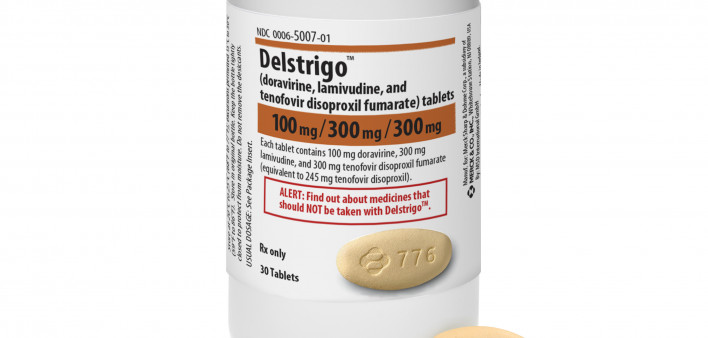Switching from a variety of antiretroviral regimens to Merck’s newly approved Delstrigo (doravirine/lamivudine/tenofovir disoproxil fumarate) is safe and effective at treating HIV, aidsmap reports.
Presenting their findings at the IDWeek conference in San Francisco, researchers from the open-label, active-controlled noninferiority Phase III DRIVE-SHIFT trial enrolled 670 people with HIV who had a fully suppressed viral load for at least six months. The participants were taking two nucleoside/nucleotide reverse transcriptase inhibitors (NRTIs) plus a Norvir (ritonavir)- or Tybost (cobicistat)-boosted protease inhibitor, Vitekta (elvitegravir), or a non-nucleoside reverse transcriptase inhibitor (NNRTI).
The participants had no history of virologic failure on any HIV regimen and had virus that was not resistant to any of the three drugs in Delstrigo.
The participants were randomized two to one to switch from their current HIV regimen to taking Delstrigo (447 people were in this immediate-start group) or to switch to Delstrigo after 24 weeks (223 were in the delayed-start group).
A total of 84.5 percent of the participants were male; 76.4 percent were white. The average age was 43 years old.
At week 24 of the study, 93.7 percent (419 of 447) of those in the immediate-start group and 94.6 percent (211 of 223) of those in the delayed-start group had a fully suppressed viral load. At this time, 1.8 percent of each group had a viral load of at least 50.
At week 48 of the study, 90.8 percent (406 of 447) of those in the immediate start group had a fully suppressed viral load. (In their analysis, the study authors also compared this rate with the viral suppression rate of 94.6 percent of those in the delayed start group at the 24-week mark.) At the 48-week mark, 1.6 percent of those in the immediate start group had a viral load of 50 or greater.
Among those who started the trial taking boosted Vitekta, the average changes in LDL cholesterol and non-HDL cholesterol at week 24 were significantly lower in the immediate-start group compared with the delayed-start group.
At the 24-week mark, rates of any adverse health event and drug-related adverse health events were higher in the immediate- versus the delayed-start group. Among those in the immediate-start group who experienced any adverse health events, these events were mild for 64 percent of these participants and were mild for 80 percent of those who experienced drug-related adverse health events.
The study authors concluded that Delstrigo was noninferior to, or as effective as, the comparison regimens and also demonstrated acceptable safety compared with continuing on the other regimens.
Editor’s note: A previous version of this article mistakenly called this study DRIVE-AHEAD rather than DRIVE-SHIFT, and also mistakenly referred to a previous conference reporting of DRIVE-SHIFT; the conference to which the previous version of the article referred was actually DRIVE-AHEAD.
To read the aidsmap article, click here.
To read the DRIVE-SHIFT conference abstract, click here.







Comments
Comments